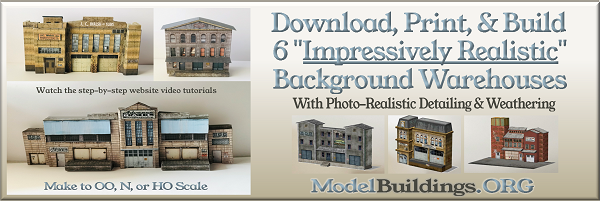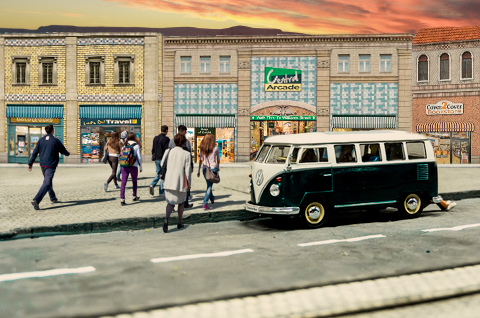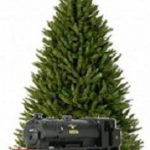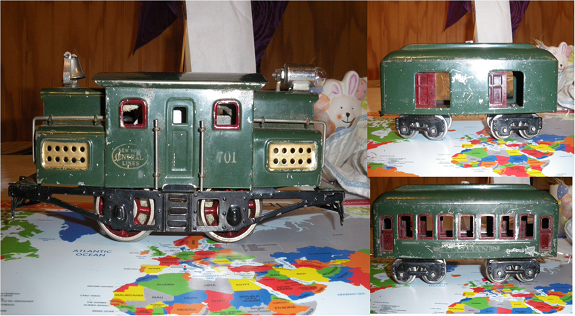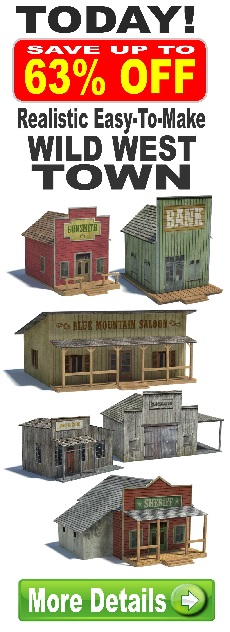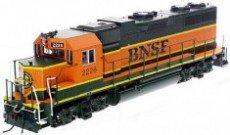Everything on model trains, model railroads, model railways, locomotives, model train layouts, scenery, wiring, DCC and more. Enjoy the world's best hobby... model railroading!
Second-Hand Trains
Cliff asks:
“Hey guys I just got 14 HO boxcars at a deceased estate sale for $90. They seem to be in good condition and most have knuckle couplers. I thought it was a good deal. How much do second-hand engines go for?”
Add your suggestions below.
Is this Volkswagen Kombi van real, or is it a scale model?
Creating a scene for a model railroad layout is not unlike a film producer creating a realistic movie set. These days many of the scenes and props in movies are generated using computer technology so that the actors and actresses can perform near impossible feats in convincingly realistic settings. The eye often sees what it wants to see. This is something to keep in mind when creating a scene for a model railroad layout.
Back to the question – Is this VW Kombie van real, or is it a scale model? It is actually a scale model.
Is the road and paving real? It looks real, but again, it is part of a model railroad layout.
Is the sky backdrop real. No, it is a photographic backdrop glued to a wall.
What about the buildings? They too are scale models, and a part of a new series at https://www.modelbuildings.org/packa-background-shops-scale-models
Are the people real? A photograph of real people has been photoshopped into this layout scene, just to make the VW Kombi Van look even more real. The eye sees what it wants to see. The orginal plastic figurines of people (although they looked real) were photoshopped out for the purposes of this demonstration.
So, next time you are designing a scene for your layout, think of it like a movie set. Carefully build the scene one element at a time. Have fun!
Recommended Manufacturer For HO Diesel Locomotives
Gavin writes:
“I’ve been searching online for a diesel loco (with sound installed), but now I’m confused with the various options. I want something that is mid-price range, reliable, and with good detailing. Are there any brands I should avoid? I appreciate everyone will have their own likes and dislikes, but some feedback based on personal experiences would be great. Thanks in advance.”
Add your thoughts below.
What’s on Your Christmas List?
Model railroading is an enduring hobby that stays with us for years… usually decades. Most layouts evolve, so there is always something new to do, something to change, or something to add. That’s why most of us have a “wish list” of what we would like for Christmas… even if we end up buying it ourselves.
What’s on your Christmas list this year?
Share your thoughts in the comments section under this post.
Wiring For Post War O gauge layout
Scott posted this question in the hope of getting some help:
“I have a 4X8 Postwar O gauge layout with a ZW transformer. Nothing extravagant there is an inner and outer loop with 2 O22 switches. I have a few accessories, nothing fancy. The problem is the layout will shut down when running after a while, the red light on the ZW will come on and after 5 seconds or so it will re-set. I’ve checked the cars one by one for a short. I’ve shut down the accessories but it still stops and then re-sets. It’s almost like it overheats? I have a bus line and feeders. Any ideas that I can troubleshoot would be appreciated. This is driving me crazy 🙂 Thanks for the help!”
Please add your suggestions to assist Scott below.
Old HO Santa Fe Locomotive With Wheel Problem
Grantley asks readers:
“I unpacked an old locomotive belonging to my late Dad, but I can’t get it to work properly. It is a Santa Fe and it works when either the front or back wheelsets are on the track, but not when both wheelsets are on the track at the same time. It has me puzzled so would appreciate any suggestions.”
Please contribute your answers or suggestions below.
This Scene Looks So Real Given The Buildings Are Scale Models
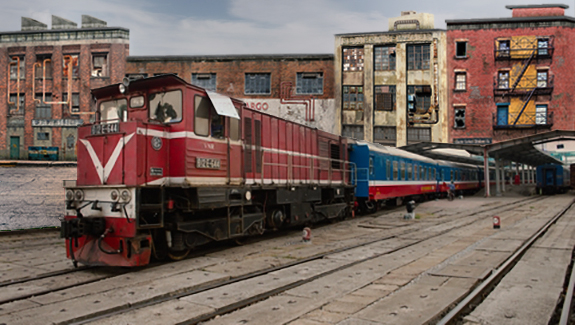
There has been some very good feedback from customers who have constructed buildings in the new “derelict buildings” series of downloadable plans. Dennis from Birmingham described them as “the most real he had ever seen” – thanks Dennis and others for the encouraging feedback. The series of background buildings includes some workshops, and some obviously abandoned factories which are suitable for displaying alongside railway tracks.
The plan options and a construction demonstration video can be seen at https://www.modelbuildings.org/derelict-railroad-models
Lionel ZW Transformer Problem
Daniel writes:
“My Lionel ZW Transformer is acting strange. One day, it is working fine. When I turned it on the next day, I had no track power and shorting out. I checked all track and found no obvious causes with the Z shirts hooked up or not. I switched the euro to another Z and the system is fine. Therefore it seems just to be the transformer. What is the best troubleshooting process? Thanks.”
Christmas Train Set – Which Track?
Debbie asks:
“My son has HO model train cars from when he was a child and also his father’s train cars from when he was a child. I would like to surprise him this Christmas by setting up a track around the Christmas tree and using some of his train cars. However, the track he has is very old and I would like to purchase new track and a new controller. What brand or type of track would be the easiest for me to assemble? I would appreciate any information! Thank you.”
Track and Circuit Control
Derek asks:
“Hi folks I am looking for anyone who knows the right name for the joining pins that go between a track controller and a circuit controller. I am looking for the joining pins that go between Hornby 900 track controller to the Hornby 910 circuit controller so the circuit controller can power trains around the track. Cheers guys”
AT LAST! Now Available 10 NEW Plans For Constructing OLD Background Buildings – Some Derelict!
https://www.modelbuildings.org/derelict-railroad-models
5 of these new scale model plans feature abandoned derelict buildings which will add character against the background of a OO, N scale, or HO scale model railroad. This short video demonstrates how easy it is to construct these downloadable plans.
